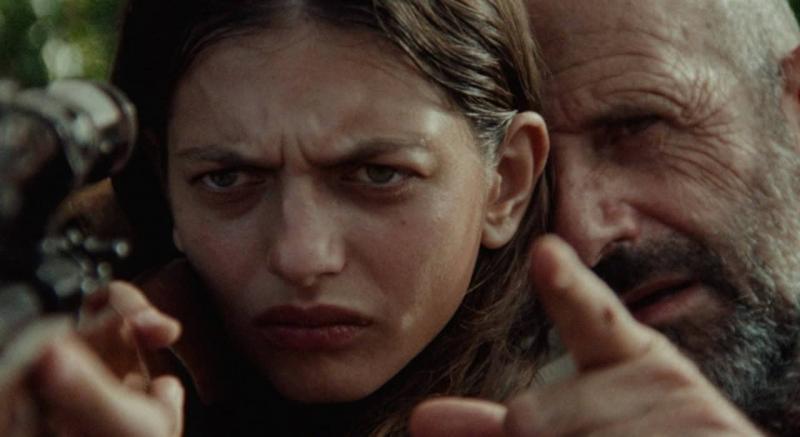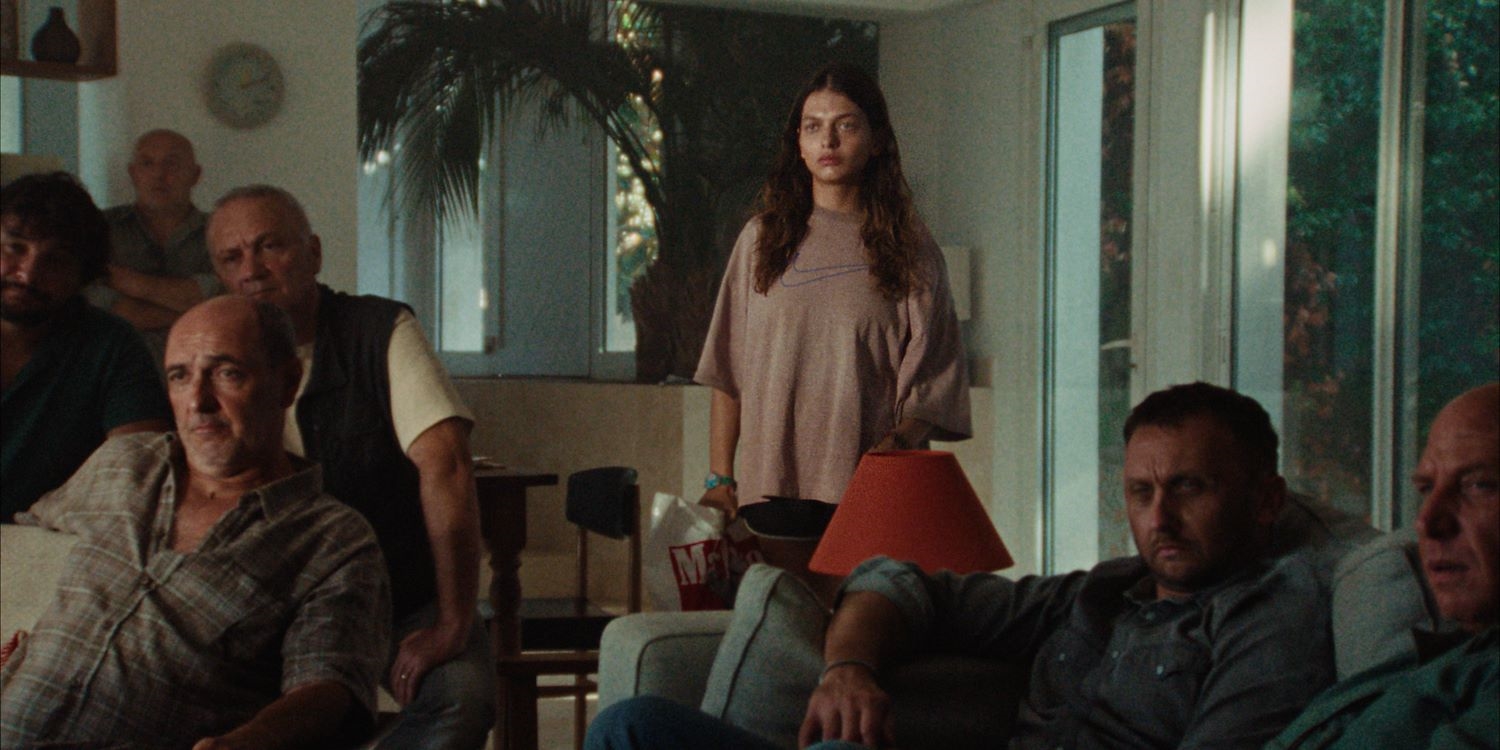The Kingdom review - coming of age as the body count rises | reviews, news & interviews
The Kingdom review - coming of age as the body count rises
The Kingdom review - coming of age as the body count rises
A teen belatedly bonds with her mysterious dad in an unflinching Corsican mob drama

The acorn doesn’t fall far from the tree is the bitter message of The Kingdom.
While depicting Mafia violence as a pestilential evil, The Kingdom allows that crime families’ blood ties and Old Testament revenge ethos prevent insiders from walking away and starting their lives elsewhere. Such is the fate of Pierre-Paul Savelli (Severiu Santucci), as he painfully explains to his 15-year-old daughter, Lesia (Ghjuvanna Benedetti), during one of the increasingly intimate conversations they have after she joins him in hiding.
The film’s story of a naive teenager’s coming of age as a mobster’s daughter strongly recalls that of Jonas Carpignano’s equally affecting – but more impressionistic – Italian-language A Chiara (2021). The French-produced The Kingdom, Colonna's fiction feature debut, was shot by Antoine Cormier in the kind of social realist style that makes “gritty” American mob thrillers seem baroque, Whenever something terrible is about to occur, Audrey Ismaël’s ominous score throbs more ominously and the cutting quickens, but neither technique feels manipulative.
Since her mother’s premature death, Lesia has been raised by her Aunt Louise (Pascale Mariani) and has barely seen her dad because of his hazardous occupation. An above-average student who hangs in bars and clubs with her cousins, Lesia has just started dating a boy when Louise abruptly drives her off one morning to leave her with an older cousin, Santu (Andrea Cossu), who takes her to the secret coastal compound where Pierre-Paul is staying with hsi henchmen.
Lesia’s vulnerability as her father's daughter on the loose in Ajaccio and the ratcheting-up of the mafia clan war means he needs to keep her close. A failed car bomb assassination attempt on Corsica's regional president, who is friendly with Pierre-Paul, actually targeted one of the caïd’s “men of honour.”
A burly, grizzled czar of retributive justice who has the beard and protuberant ears of a Tolkien dwarf, Pierre-Paul takes Lesia sea fishing, swimming, and boar-hunting when he has time. Aware that these precious bonding sessions are finite, he calls them their “kingdom”; they are as poignant as the Turkish package holiday taken by Calum and Sophie in Charlotte Wells’s Aftersun (2022).  Lesia tells a longtime woman friend (Marie Murcia) of Pierre-Paul, seemingly his sometime mistress, that she only endures boar-hunting to spend time with him. When he urges Lesia to shoot a boar she has lined up in her rifle’s scope – a sequence tensely crosscut with a mob hit he has ordered – she spares the animal. The simple but powerful metaphoric scene involving a boar’s carcass that silently opens the film suggests she is made of sterner stuff.
Lesia tells a longtime woman friend (Marie Murcia) of Pierre-Paul, seemingly his sometime mistress, that she only endures boar-hunting to spend time with him. When he urges Lesia to shoot a boar she has lined up in her rifle’s scope – a sequence tensely crosscut with a mob hit he has ordered – she spares the animal. The simple but powerful metaphoric scene involving a boar’s carcass that silently opens the film suggests she is made of sterner stuff.
Pierre-Paul initially keeps Lesia away from his planning sessions with his crew, which includes her fondly regarded godfather Joseph (Thomas Branzini). After the rival clan has Joseph murdered by an associate, it becomes clear to Lesia that not all the avuncular hardmen (pictured above with Ghjuvanna Benedetti) whom she breakfasts and watches TV news with will necessarily survive the next 24 hours. When Santu and the coldly efficient Sté (Anthony Moganti, above right) return from the hit, Lesia is overcome by relief and rushes to hug them.
After the gang is forced to relocate by a bratty act of defiance by Lesia, father and daughter disguise themselves – he as an ageing hipster, she as a bottle blonde (anachronistically more Billie Eilish than Debbie Harry). Having admitted Lesia to his conferences, Pierre-Paul continues her education by confessing to her his bloody history – his moral justification of it providing her with an uneviable legacy. He fled to Venezuela with his wife in his early thirties after eliminating the twenty or so men who had conspired to kill his father – in front of him – when he was six.
During their 13-year South American idyll, Pierre-Paul lovingly reminisces, Lesia was born there. Three years later they came home – presumably so he could partake in international drug trafficking opportunities afforded “Union Corse” in the 1980s and the rejuvenated clan warfare complicated by the enmity of the paramilitary National Liberation Front of Corsica.
By channelling his deglamourising take on mob violence through the wide-eyed Lesia’s subjectivity, Colonna enables viewers to share in her distress and her mounting fear for him as a marked man with most of his nine lives used up. The alacrity with which she adapts to his lifestyle and values gives pause; there’s more than a hint of animal instinct in it.
Flawlessly performed by non-professional Corsican actors, The Kingdom, which is set in 1995, ends on a diminuendo but slightly ambiguous note. What would Lesia be doing now if she'd made it to 45 without being sprayed by bullets? Whatever she’d be running, it wouldn't be a stall in a farmer’s market.
The future of Arts Journalism
You can stop theartsdesk.com closing!
We urgently need financing to survive. Our fundraising drive has thus far raised £49,000 but we need to reach £100,000 or we will be forced to close. Please contribute here: https://gofund.me/c3f6033d
And if you can forward this information to anyone who might assist, we’d be grateful.

Subscribe to theartsdesk.com
Thank you for continuing to read our work on theartsdesk.com. For unlimited access to every article in its entirety, including our archive of more than 15,000 pieces, we're asking for £5 per month or £40 per year. We feel it's a very good deal, and hope you do too.
To take a subscription now simply click here.
And if you're looking for that extra gift for a friend or family member, why not treat them to a theartsdesk.com gift subscription?
more Film
 The Kingdom review - coming of age as the body count rises
A teen belatedly bonds with her mysterious dad in an unflinching Corsican mob drama
The Kingdom review - coming of age as the body count rises
A teen belatedly bonds with her mysterious dad in an unflinching Corsican mob drama
 Weapons review - suffer the children
'Barbarian' follow-up hiply riffs on ancient fears
Weapons review - suffer the children
'Barbarian' follow-up hiply riffs on ancient fears
 theartsdesk Q&A: filmmaker Dag Johan Haugerud on sex, love, and confusion in the modern world
The writer-director discusses first-love agony and ecstasy in 'Dreams', the opening UK installment of his 'Oslo Stories' trilogy
theartsdesk Q&A: filmmaker Dag Johan Haugerud on sex, love, and confusion in the modern world
The writer-director discusses first-love agony and ecstasy in 'Dreams', the opening UK installment of his 'Oslo Stories' trilogy
 Oslo Stories Trilogy: Dreams review - love lessons
First love's bliss begins a utopian city symphony
Oslo Stories Trilogy: Dreams review - love lessons
First love's bliss begins a utopian city symphony
 Blu-ray: Two Way Stretch / Heavens Above!
'Peak Sellers': two gems from a great comic actor in his prime
Blu-ray: Two Way Stretch / Heavens Above!
'Peak Sellers': two gems from a great comic actor in his prime
 Late Shift review - life and death in an understaffed Swiss hospital
Petra Volpe directs Leonie Benesch in a compelling medical drama
Late Shift review - life and death in an understaffed Swiss hospital
Petra Volpe directs Leonie Benesch in a compelling medical drama
 The Naked Gun review - farce, slapstick and crass stupidity
Pamela Anderson and Liam Neeson put a retro spin on the Police Squad files
The Naked Gun review - farce, slapstick and crass stupidity
Pamela Anderson and Liam Neeson put a retro spin on the Police Squad files
 theartsdesk Q&A: actor Lars Eidinger on 'Dying' and loving the second half of life
The German star talks about playing the director's alter ego in a tormented family drama
theartsdesk Q&A: actor Lars Eidinger on 'Dying' and loving the second half of life
The German star talks about playing the director's alter ego in a tormented family drama
 The Fantastic Four: First Steps review - innocence regained
Marvel's original super-group return to fun, idealistic first principles
The Fantastic Four: First Steps review - innocence regained
Marvel's original super-group return to fun, idealistic first principles
 Dying review - they fuck you up, your mum and dad
Family dysfunction is at the heart of a quietly mesmerising German drama
Dying review - they fuck you up, your mum and dad
Family dysfunction is at the heart of a quietly mesmerising German drama
 theartsdesk Q&A: director Athina Rachel Tsangari on her brooding new film 'Harvest'
The Greek filmmaker talks about adapting Jim Crace's novel and putting the mercurial Caleb Landry Jones centre stage
theartsdesk Q&A: director Athina Rachel Tsangari on her brooding new film 'Harvest'
The Greek filmmaker talks about adapting Jim Crace's novel and putting the mercurial Caleb Landry Jones centre stage
 Blu-ray: The Rebel / The Punch and Judy Man
Tony Hancock's two film outings, newly remastered
Blu-ray: The Rebel / The Punch and Judy Man
Tony Hancock's two film outings, newly remastered

Add comment